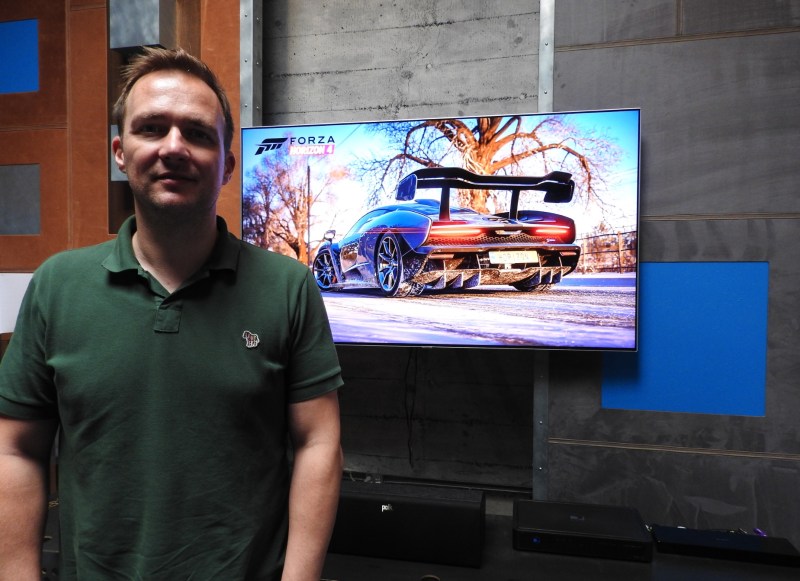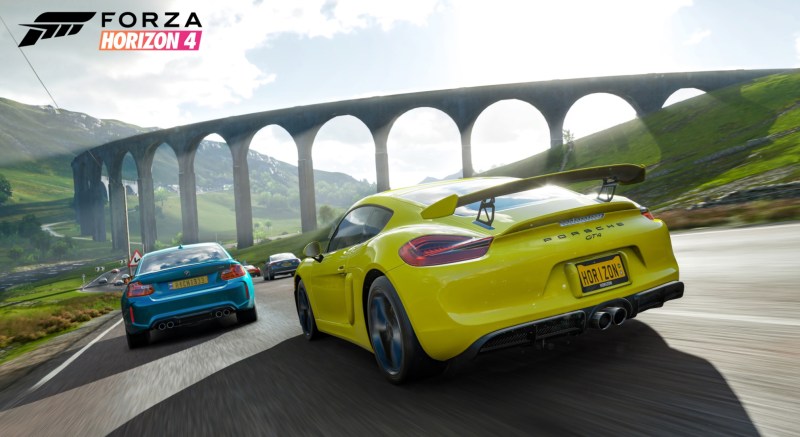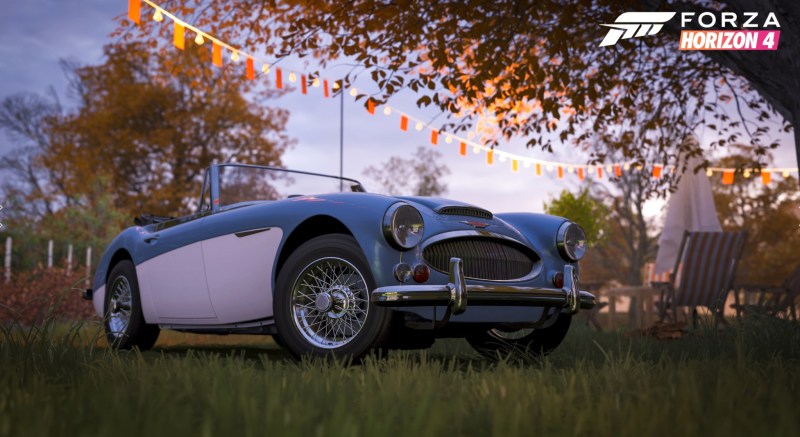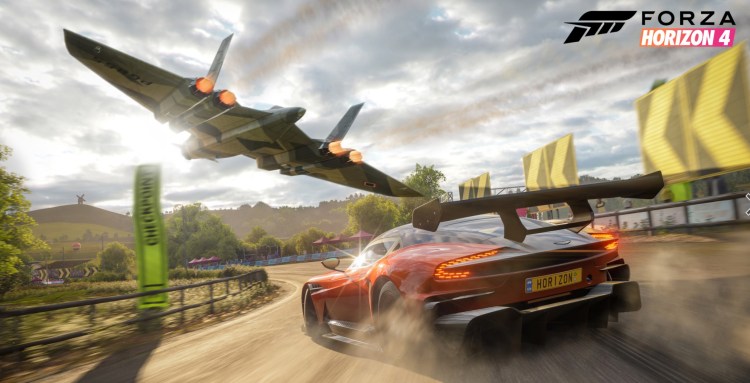Every now and then, I like to let my inner race car driver out and play a racing game. From Mario Kart to Project Cars or Forza, I play casually and just try to stay on the track.
But millions of players out there take their racing games seriously, and many of them are anticipating the October 2 release of Forza Horizon 4 on the Xbox One and the Windows PC. One of the big things that is different with this version is the introduce of full seasons with dynamic weather.
The seasons change every couple of weeks, giving players a chance to burn rubber during the summer or slide around on leaves during the fall on the same tracks. In the winter, you have to deal with the rain or snow. On a slippery track, you can’t take as many risks, even though that same track is perfectly safe in the summer. You’ll encounter things specific to the nature England, where the game is set. Lots of small stone walls, for instance, represent barriers along the side that you can blast right through. But the big stone walls will stop your car old.
This differences made designing the game more fun — and a massive effort, said Ralph Fulton, creative director at Playground Games, which developed the game with Turn 10 Studios. I took Forza Horizon 4 for a brief spin at a preview event in San Francisco, and then I interviewed Fulton about the experience.
June 5th: The AI Audit in NYC
Join us next week in NYC to engage with top executive leaders, delving into strategies for auditing AI models to ensure fairness, optimal performance, and ethical compliance across diverse organizations. Secure your attendance for this exclusive invite-only event.
Here’s an edited transcript of our interview.

Above: Ralph Fulton is creative director of Playground Games, developer of Forza Horizon 4.
GamesBeat: The seasons change everything, then?
Ralph Fulton: Seasons change everything! That’s what we find. It sounds like a bit of a marketing tagline, but–it’s not intentionally so. It’s one of those things that I think is true right across the game. It’s certainly something that — when you invest as much in a single feature as we have in seasons, it’s a long time coming. There’s been a bunch of false starts over the years as we’ve thought about it. How can you do changing seasons in an open world game?
This is the first time we’ve thought, as a studio, that we’re mature enough in terms of development and pipelines and tools that we could take on this huge amount of work. Effectively it amounts to a world the size of Horizon 3’s Australia, done four ways. Each season is profoundly different. When you invest that much in that kind of feature, you don’t want to short-change it. You want to make sure you’re delivering on every aspect of the game.
Obviously visuals are what jumps out at you most immediately, but the driving experience, the gameplay — using seasons as the operator to change up more fundamental aspects of the game. We bring in new content every week with each new season. We’re also using it as a mechanism for our live support of the game. After the first four weeks that the game is live, the first year in Horizon, we’ll bring in new updates with new features and new content and customization options. That’ll be free for everyone.
That’s going to be the rhythm we get into with the game. The team’s job is now to go support this game and evolve this game for our players. It has that cadence to bringing new stuff.
GamesBeat: How did you decide on weekly seasons?
Fulton: We’re going with weekly based on analysis of how people play our game. Horizon 3 has been a huge boon to us in many regards, but one — I think we’ve sailed past 10 million players, which is great. It gives us this incredibly robust data set we can look at and analyze to see how people play our game.
A lot of things that we suspected are true about our players in terms of the number of sessions they have per week, the average session length, and also the fact that our game — and we’re incredibly fortunate in this regard — is kind of evergreen. It’s not a game that people binge and drop. They play in a fairly metered, regular fashion. When Call of Duty comes out and they go away and play Call of Duty, they come back to it later and they resume almost with the same regularity that they had.
That speaks to us about what the game is for, how people use the game, and therefore how we should be setting up the game’s experience in a way that supports and complements that.

Above: Forza Horizon 4
GamesBeat: A large group of players can get through the content for a week, and then they have something different the next week.
Fulton: The important thing to understand about seasons is there’s a bedrock of content in the game that’s season-agnostic. Something that’s important to us about the seasons is they change, and you experience the visuals, but you can still do everything you love doing in Horizon. There are no doors closed because it’s winter or because it’s summer. All of that stuff is the constant, and then the seasons bring in seasonal championships, events, new stock in the shop, a bunch of new things that layer on and keep the game fresh.
GamesBeat: How do you think it fits in as far as how easy and accessible the driving is? At least on a normal setting.
Fulton: We think of ourselves now as the driving game for everyone. That sort of accessibility and inclusivity is important to us. In a pick up and play sense, you should be able to have fun instantly, regardless of skill level. A lot of our features, a lot of our modes are designed to make sure there is no barrier to entry that’s skill-based. If you’re terrible at the game, you can still find enjoyment in doing these things without the game saying, “Nope, try again.” I think that design ethos is kind of old-fashioned now.
The great thing about Forza is that the depth is there if you want to access it, on a number of different axes. In terms of vehicle physics, I can tune my car and upgrade my car. I don’t do it myself, because it’s not what I get out of the game, but I know a lot of people love that sort of depth. You can push the difficulty and set yourself a higher challenge if you want, but that’s always a ball that’s in your court as opposed to the game just prescribing it. These are things that the Forza franchise embodies — not just Horizon — that have made it what it is.
GamesBeat: I saw that the stone walls were fairly pliable. I could knock them over. There were some walls, though, you hit them and you stop.
Fulton: I know you’ve only played for a very short period of time. That’s something we’ve worked hard on in the studio. I think you’ll find that, in a very short space of time, you’ll get to understand the visual language of those things. Britain is full of dry stone walls. They’re tens or hundreds of years old, and they’re everywhere in rural areas, to the point that we couldn’t not have them. But if we have them, they can’t be unbreakable. If they stopped you every time, you’d have a bad time. We had to make them breakable.
Equally, there are some brick walls or stone walls that won’t break, but there’s quite a clear visual language that you’ll quickly learn to interpret. The same with trees. A big feedback point we had from Horizon 3 was that it was never very clear whether a tree was going to break or not. Obviously that uncertainty led to frustration. We spent a lot of time, and honestly I think we’ve nailed it. There’s a very a clearly language to trunk width — never thought I’d talk about trunk width in a game, but there you go — so that there’s a range of widths that are breakable and then a range that are not. There’s quite a big gap between those two. Very quickly you’ll be able to look at the horizon and interpret the width of a tree, and therefore whether it’s going to stop you or whether you can break it.
GamesBeat: If you miss a checkpoint, you get reset?
Fulton: That’s right.

Above: Forza Horizon 4
GamesBeat: It seemed to offer a liberal interpretation of whether you go through the flag, though.
Fulton: The checkpoint system is just a necessary construct of the way we make races that can go anywhere. Also, it’s almost doubly important now that we’re introducing the route creator. You’ll be able to build your own routes using the flag checkpoint system. We try to err on the side of the player whenever we can. You really only have to clip the edge of it with the outside of your car and we’ll let you get away with it. And you can always do the rewind.
GamesBeat: How does it go on the other end, where it’s satisfying for the most hardcore players?
Fulton: Again, that just comes from depth. You can switch off the assists. You can benefit from that. You’re going to get increased rewards as a result of making the difficulty harder for yourself. But there’s probably a bit more authenticity in our tire and suspension modeling this time. Which is not to say anything particularly deep about our physics. It’s more just that you’ll feel the different surface types. There are more in this game than there ever have been before.
In particular, you’ll feel temperature having an effect on your car, as the ambient temperature changes through the day. That’s probably most profound in winter, where you get a higher range of temperature through the day. That’s a new concept we’ve introduced. It just adds a bit more depth to the way the vehicle dynamics work.
GamesBeat: I didn’t spend too much time creating a character, but is that somewhere you’ve focused as well?
Fulton: There are 14 you can choose from. Really, the customization and personalization comes later in the game, as you start to unlock clothing and the like. The personalization is all about how you dress the character. Different people approach customization in different ways. I want someone who looks like me, or I want someone who looks completely unlike me, or I want someone who looks preposterous and absurd. All those options are available.
It felt like an important thing as we moved into the shared world concept, where you’re not alone in the world anymore. You’re with other real people, and that sense of having an identity, being able to stamp your personality on your character and your presence in the world, that becomes more important than it was when Horizon was a solo experience.
GamesBeat: And the same for the cars as well, over time?
Fulton: Oh, yeah, absolutely. We’re always looking for new ways to allow our players to express themselves. Last time you could set up your personalized license plate. We add new things with each successive game which just immerses you more in the world that you’re inhabiting.

Above: Forza Horizon 4
GamesBeat: What are some of your favorite things about each of the seasons?
Fulton: I could reel off a laundry list of things that are different in each season, but I’ll give you the more personal, experiential take on it. The most magical thing about the seasons is when they change. It doesn’t really matter whether it’s autumn to winter or spring to summer, so much as the fact that you’ve been playing the game — we play on this cycle in the dev studio, so we’re playing the game for a week, and then it changes. It’s like your game is new again.
You get that feeling you get when you put a game in for the first time. Everything is new. Normally you never recapture that, because a familiarity sets in. The great thing about seasons is that on a weekly basis, our game almost becomes new again, and that’s something that will make you think differently about the Horizon games, but it’s also going to make you think differently about open world games as well. It’s the reason we’ve chased this holy grail for a number of games now. This is the first game we’ve attempted it and taken it on, but it’s why we’ve been going after it.
It’s not just because, hey, different weather, people will love that. It’s about the sense of being in an open world. We’re trying to immerse you in a place where you actually feel that time is passing and you have a presence in an evolving world. It’s not just a static snapshot of a world, that Groundhog Day effect.
GamesBeat: Different things affect your driving that you have to master.
Fulton: The balance with all the seasons is, one, reflecting what that season is like and making sure it’s different, but on the other hand, also making sure you can still do all the things you want to do in a Horizon game. We’re not gating anything away because of a season. We’re not saying that you can’t take that supercar out this week because it’s winter. You still need to be able to take your cars out, go real fast, and have all the experiences you love about Horizon. We’re still about that breadth, about that chocolate box design mentality, whether you’re in autumn or winter.
A lot of people said, after Horizon 3, and I think a little unkindly, “How are you ever going to top that?” Honestly, if enough people say that to you, you start to think — I always believed in the team’s ability, in the team’s hunger for improvement and evolution. This game bears that out. It’s the best game we’ve ever made, the biggest and the most ambitious. The way the team has executed is phenomenal. I can’t for people to get their hands on it.


